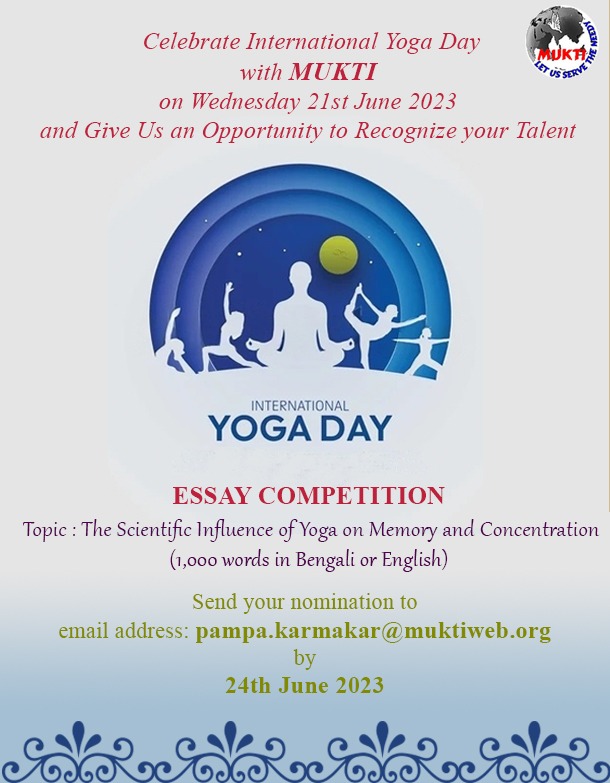

Yoga: Enhancing Memory Power and Concentration; A Scientific Perspective
Mukti arranged an essay competition for TSS students on the occasion of International Yoga Day 2023, focusing on the topic “The Scientific Impact of Yoga on Memory and Concentration.” Out of the 11 submissions received, Debanjan Sardar, a second-year MBBS student from Midnapore Medical College & Hospital, emerged as the winner. Chayanika Das secured the second position. Mukti extends its heartfelt congratulations to both of them. The organization is truly inspired by the immense enthusiasm displayed by the students and wishes all the participants the best of luck in their future endeavors.

Introduction:
In the fast-paced world, we live in, memory power and concentration often take a backseat, resulting in difficulties in learning, productivity, and overall well-being. However, an ancient practice called yoga offers a holistic approach to improving these cognitive abilities. This essay aims to explore the relationship between yoga, memory power, and concentration from a scientific standpoint. By examining the impact of yoga on the brain, stress reduction, mindfulness, and physical well-being, we can uncover the scientific mechanisms underlying its ability to enhance memory and concentration.
The Brain-Body Connection:
Scientific research reveals that yoga can significantly impact the brain’s structure and function, ultimately leading to improved memory and concentration. Regular practice of yoga postures, or asanas, increases blood flow to the brain, delivering essential nutrients and oxygen. This increased blood flow enhances neural connections and promotes neuroplasticity, the brain’s ability to reorganize itself and form new neural pathways.
Moreover, yoga engages both hemispheres of the brain through specific postures, such as the Tree Pose or Balancing Asanas. This bilateral activation promotes better communication between brain regions responsible for memory and concentration, optimizing cognitive performance.
Stress Reduction and Cortisol Regulation:
Chronic stress is a significant hindrance to memory and concentration. The practice of yoga incorporates deep breathing exercises, meditation, and relaxation techniques that activate the parasympathetic nervous system, promoting a state of relaxation and reducing stress levels. This physiological response leads to a decrease in the production of cortisol, the primary stress hormone.
When cortisol levels are elevated for extended periods, it can impair memory and attention. Yoga’s ability to regulate cortisol helps restore optimal hormonal balance, promoting mental clarity and enhancing cognitive abilities.
Mindfulness and Focus:
Yoga emphasizes mindfulness, which involves directing attention to the present moment without judgment. Research suggests that mindfulness meditation, a key component of yoga, enhances working memory and cognitive flexibility, enabling individuals to sustain attention and concentrate on tasks effectively.
Mindfulness-based practices activate the prefrontal cortex, the brain region responsible for executive functions like decision-making, attention, and working memory. By training the mind to focus on the present, yoga cultivates mental discipline and sharpens concentration skills.
Physical Well-being and Cognitive Function:
Physical exercise is closely linked to cognitive function, and yoga offers a unique blend of physical movements, breath control, and relaxation. Regular yoga practice improves cardiovascular health, increases lung capacity, and enhances overall fitness. These physical benefits play a crucial role in enhancing memory and concentration.
Aerobic exercises, such as sun salutations, boost the production of brain-derived neurotrophic factor (BDNF), a protein that promotes the growth of new neurons and strengthens existing connections. Increased BDNF levels contribute to enhanced cognitive function, memory consolidation, and improved learning abilities.
Additionally, yoga stimulates the release of endorphins, known as the “feel-good” hormones, which reduce anxiety and elevate mood. A positive emotional state nurtured through yoga positively affects memory recall and cognitive performance.
Conclusion:
In conclusion, the scientific evidence supports the powerful effects of yoga on memory power and concentration. By integrating yoga into our lives, we can harness its benefits in the realm of cognitive enhancement. The brain-boosting mechanisms of yoga, including improved blood flow, stress reduction, mindfulness, and physical well-being, provide a solid foundation for enhanced memory and concentration. Embracing yoga as a regular practice has the potential to unlock our cognitive potential, helping us thrive in our personal, academic, and professional pursuits.
Project Activities
- About Mukti (2)
- Accreditation (31)
- AGM (63)
- Agriculture Reforms (16)
- ahm2017 (4)
- ahm2017news (2)
- ahm2017runners (2)
- ahm2018runners (1)
- Ambulance Service (2)
- Amplifying Community Voices (9)
- Awards (22)
- Awareness and Empowerment (13)
- Awareness drives (1)
- Book-Bank (13)
- Careers (8)
- CARR (32)
- Ccp1011 (4)
- Chick Rearing Programme for Marginalised Women (5)
- Climate Resilience River Embankment (1)
- Coaching Center (102)
- Community Clinic (2)
- COVID19 (62)
- Cyclone Amphan Relief and Rehabilitation (129)
- Cyclone Bulbul Relief (30)
- Cyclone Relif (2)
- Cyclone Yaas Relief and Rehabilitation (68)
- Editorial (21)
- Editorial by Abir Biswas (1)
- Editorial by Ankita Kothiyal (1)
- Editorial by Kasturi Bakshi (1)
- Editorial by Prof. Pradeep Ray (1)
- Editorial by Ranitendranath Tagore (1)
- Editorial by Sankar Halder (10)
- Editorial by Satyajit Ray (3)
- Editorial by Sohini Mehta (1)
- Editorial by Soumitra Bose (1)
- Editorial by Subhankar Basu (1)
- Education and Enrichment (34)
- Environment and Resilience (9)
- Essential Items Distribution (19)
- Fair/Exibition (1)
- Featured Activities (10)
- Go Green (81)
- Gram Clinic (2)
- Green (20)
- Health (8)
- Health Water & Sanitation (17)
- Hello Beta (1)
- Impact Stories List (31)
- Integrated Development (11)
- Jal hi Kal (2)
- Kerala Flood Relief (3)
- Kitchen Gardening (2)
- Livelihood & Enablement (20)
- Marathon (13)
- MCDF (14)
- Mcdf (112)
- Mcom (6)
- Medical Camp (8)
- MIT (3)
- MKSS (6)
- MSS (11)
- MUKTI Community Shop (1)
- Mukti Craft (2)
- Mukti Cultural (1)
- Mukti Employment (2)
- Mukti Fresh (2)
- Mukti Gram - Egra (2)
- Mukti Gram - Purbashridharpur (8)
- Mukti Gram, Model Village (136)
- Mukti Green (6)
- MUKTI Institute of Technology (MIT) (3)
- Mukti Kishalaya (2)
- Mukti Support (1)
- Mukto Dhara (1)
- NaRKEL (9)
- Obituaries (4)
- Observance Days Celebration (10)
- Organic Farming (3)
- Organic Farming & Training Support (8)
- Pandemic Support (2)
- Pond Rejuvenation (1)
- Prerana (4)
- Projects For Mukti Wide (3)
- Rights and Special Needs (19)
- Riste (2)
- RTI (14)
- Sahosini (3)
- SAM (9)
- Sam (89)
- SDF (9)
- Skill & Enterprise Development (2)
- Skill Enterprise (2)
- star-of-the-week (9)
- STEP (1)
- Success Stories (39)
- Success Story Coaching Center (1)
- Success Story MCDF (6)
- Success Story RTI (1)
- Success Story SAM (9)
- Success Story TSS (20)
- Sundarbans Green (SUN-G) (1)
- Sunderban development fair project (7)
- Sustainable Agriculture (2)
- SWAS (2)
- SwasthoSongini (4)
- Swavlamban Accelerator in Sundarbans (SWAS) (2)
- Talented (2)
- Tour for Cause (31)
- TSK25 2017 (7)
- TSK25 2017 Runners (7)
- TSS (17)
- TSS (112)
- Uncategorized (59)
- Valued Partners (3)
- Vclpk (1)
- Vetp (2)
- View (2)
- VOICE (2)
- workshop (109)